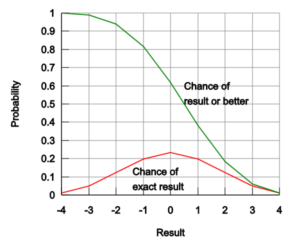 Most RPGs are predicated on the 50% success rule. Heroes will succeed half the time they attempt a task. Fate Core takes a quantitatively different approach by predicating on the 100% success rule. Heroes are equal to any task which they attempt to undertake. The static skills test throws the differences between the two approaches into stark contrast and highlights the effectiveness of each.
Most RPGs are predicated on the 50% success rule. Heroes will succeed half the time they attempt a task. Fate Core takes a quantitatively different approach by predicating on the 100% success rule. Heroes are equal to any task which they attempt to undertake. The static skills test throws the differences between the two approaches into stark contrast and highlights the effectiveness of each.
The 50% rule is seen most clearly in skill tests against a static difficulty. Pathfinder and the d20 games even have an option for players to automatically succeed at tasks within a certain difficulty range. This is known as Taking Ten or Taking Twenty because it assumes an average die roll. This type of mechanic evolved from the roots of the game as a tactical simulation, under the philosophy that success should be based on tactical choices rather than luck. When adapted for dramatic simulation, the die roll represents the effort of the characters in a very real way.

